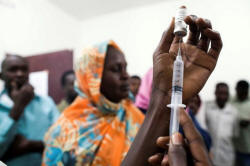|
 In
yellow fever war, WHO readies plan to stretch vaccine supply In
yellow fever war, WHO readies plan to stretch vaccine supply
 Send a link to a friend
Send a link to a friend
[June 10, 2016]
By Ben Hirschler
LONDON (Reuters) - The worst yellow fever
outbreak in decades, which has killed 325 people in Angola and spread as
far as China, has prompted the World Health Organization (WHO) to draw
up plans to eke out vaccine supplies by using one-fifth of the normal
dose.
|
|
 Alejandro Costa, team leader for emergency vaccination and
stockpiles, said an expert meeting would consider the plan next
week, paving the way for the WHO to advise countries to shift to the
lower dose on a emergency basis if necessary. Alejandro Costa, team leader for emergency vaccination and
stockpiles, said an expert meeting would consider the plan next
week, paving the way for the WHO to advise countries to shift to the
lower dose on a emergency basis if necessary.
Fears of a wider outbreak of the mosquito-borne disease were fueled
this week by the confirmation of locally transmitted yellow fever in
Kinshasa, capital of the Democratic Republic of Congo (DRC).
A major outbreak in the city would leave healthcare authorities with
little choice but to cut the dose per patient.
"If we have to vaccinate Kinshasa, that would be a trigger," Costa
said in a telephone interview on Thursday. "We don't have enough
vaccine. Kinshasa has a population of 12 million to 14 million
people and we only have today around six million doses."

Concerns about limited vaccine supplies have been building for some
time, with independent medics calling for low-dose use in an article
The Lancet journal in April.
Limited scientific research suggests a one-fifth dose works as well
as the full dose, although it is not clear if it lasts as long.
Studies to date have also only involved adults, so it is uncertain
how well children would be protected.
The current outbreak of yellow fever was first detected in Angola in
late December 2015 and has since spread into DRC, Congo-Brazzaville,
Kenya and Sao Tome, as well as to China, which has close commercial
ties with oil-rich Angola.
DEPLETED STOCKPILE
The International Federation of Red Cross and Red Crescent Societies
called on Wednesday for an immediate scale-up in response, warning
that limited vaccine supplies and other problems could turn Angola's
epidemic into a larger crisis.
[to top of second column] |

While the population in the Angolan capital of Luanda is now almost
completely vaccinated, this has depleted the world's emergency
stockpile of vaccines, and a slow vaccination campaign has allowed
the virus to spread elsewhere.
Yellow fever is transmitted by the same mosquitoes that spread the
Zika and dengue viruses, although it is a much more serious disease.
The "yellow" in the name refers to the jaundice that affects some
patients.
Although approximately six million vaccine doses are kept in reserve
for emergencies, there is no quick way to boost production when
there is a spike in demand, as at present.
Manufacturers, including the Institut Pasteur, government factories
in Brazil and Russia, and French drugmaker Sanofi, use a
time-consuming method involving sterile chicken eggs.
(Reporting by Ben Hirschler; Editing by Gareth Jones)
[© 2016 Thomson Reuters. All rights
reserved.] Copyright 2016 Reuters. All rights reserved. This material may not be published,
broadcast, rewritten or redistributed.
 |